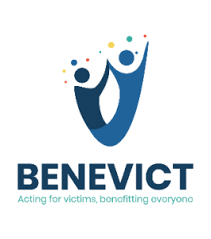- Partnership for the development of educational tools tackling gender-based cyber violence
The project aims at creating educational tools that will enable to prevention and combat of gender-based violence (GBCV) by developing new skills and building the capacity of the partnering organization to work transnationally. The project intends to upgrade a set of new ICT skills and enable change at the individual and organizational level that will transform them into full-fledged entities being able to face the future challenges linked with the upcoming new forms of GBCV.
The project is co-financed by the European Union within the Erasmus Plus program and run in cooperation with Victim Support Malta (VSM).

2. BENEVICT
„Benefits of full implementation of the Victims’ Rights Directive” project (BENEVICT) is dedicated to developing the evidence base for advancing the rights of victims of crime and influencing the future of victims’ rights in the EU as well as enabling a broad pan-EU partnership to raise to the challenge of improving victims’ realities across the EU.
Since 2012, the EU Member States have been expected to implement the Victims’ Rights Directive and continue developing services for victims of crimes. Since 2016, infringement proceedings against 21 Member States have been instigated for the failure to transpose the Directive. In most MSs, victims’ experiences still need a lot of improvement. There is still very limited evidence that can help understand the basic elements of victimisation: its scope, impacts, costs and benefits of victim support.


3. Community-based educational tools for the prevention of cyberbullying and cybervictimisation
The project aims to create community-based educational tools tackling cyberbullying and to build the capacity of the partnering organisation to work transnationally in this area. The project intends to fine-tune the existing cyberbullying programs and develop skills that will enable change at the individual and organisational levels. The project is expected to
help to transform partners into full-fledged entities to face future challenges linked with different forms of youth cyberbullying.
The project, co-financed by the EU, is being run by the partnership created by ADIJ22 (France, Leader) and Stowarzyszenie DROGA (partner) between 01/11/2023 and 31/10/2025.

4. The upskilling organisational potential of stakeholders in providing grassroots services to victims of hate crimes
The project aims to create educational tools to develop more resilient local communities and build the capacity of the partnering organisation to counteract hate crimes. The project intends to fine-tune the skills of the relevant professionals and stakeholders handling hate crimes that will enable change at the individual and organisational levels. The project is
expected to help transform partners into fully-blown entities to face future challenges linked with all side effects of HC.
The project, co-financed by the EU, is being run by the partnership created by Stowarzyszenie DROGA (leader) and Lab.in.s (partner, Italy) between 01/11/2023 and 30/04/2025.

5. CROSSING PROTECT
The aim of the project is to build an international partnership of organizations supporting a system of building competencies and educational tools for the development of restorative justice for victims of domestic violence. The project is intended to train representatives of institutions supporting victims of domestic violence in the use of tools offered by the restorative justice system to protect victims of domestic violence.
The project will be implemented by a consortium composed of the following organizations: Leader: Welcome a.p.s (Italy). Partners: VSE (Belgium), Associazion Sponde’ Olnus (Italy), APAV (Portugal), Waage Haanover e.v (Germany), Rete Dafe (Italy), Stichting Hoger Beroepsonderswijs Haaglanden (Netherlands), Klaipedos Socialines ir Psichologines Pagalbos Centras (Lithuania), Institiuto Superior de Ciencias Sociais et Policitas (Portugal) and the DROGA Association.

The project is financed by the EU within Erasmus Plus program.
6. E+ ACCREDITATION 2021-2027
In 2023, the DROGA Association obtained accreditation in the area of educational mobility for adults, which enables simplified access to the possibility of obtaining funding under Action 1. The granting of accreditation is a guarantee of regular receipt of funding for activities related to mobility under the Erasmus program and the possibility of applying for it. Accreditation under a simplified procedure – once for the entire edition of the program.
As part of the accreditation received, the DROGA Association plans to develop its activities to support socially excluded people in the area of digital, linguistic and analytical skills related to data processing, the use of quantitative methods and the development of civic attitudes and social activities.
